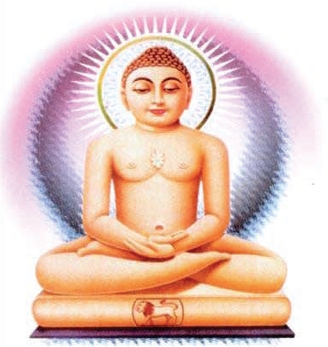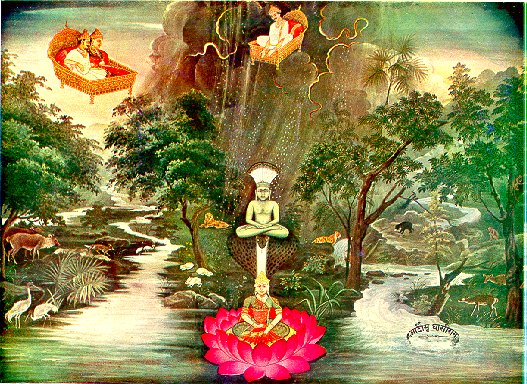
Mulasutras
Two explanations are offered for the term 'Mūlasūtra'. Some scholars are of the opinion that the term 'Mūlasūtra' means the original text, i. e., the text containing the original words of Lord Mahāvīra as received directly from his mouth. Some are of the view that the Mūlasūtras are the fundamental texts intended for those who are at the beginning of their spiritual career. The following works are designated as Mūlasūtras:
The Uttarādhyayana consists of thirty-six chapters which deal with different topics pertaining to asceticism, discipline, death, karma, metaphysics, legends, penances, ceremonialism, sacrifice etc. It contains nice parables and similes as well as beautiful dialogues and ballads.
The Daśavaikālika gives some important rules relating to ascetic life. It contains ten chapters and two appendices. The fifth chapter has two sections and the ninth four. Some of the verses of this work agree word for word with those of the Uttarādhyayana.
The Āvaśyaka is divided into six sections known as Sāmāyika, Caturviṁśatistava, Vandana, Pratikramaṇa, Kāyotsarga and Pratyākhyāna. It deals with monastic jurisprudence.
The Piṇḍaniryukti consists of 671 verses. It gives a detailed description of the type of food a monk is expected to accept.
The Oghaniryukti consists of 811 verses. It deals with some general rules of monastic discipline.
Chedasūtras
The word 'cheda' means 'cut'. Probably the treatises that prescribed cuts in seniority of monks on their violating monastic discipline, were called Chedasūtras. The existing texts belonging to this group are not exclusively devoted to this type of punishment. They deal with all sorts of topics pertaining to monastic jurisprudence. The following works are included in this group:
The Niśītha consists of twenty chapters. It prescribes some rules pertaining to monastic life. Punishments for various transgressions are also prescribed in it. Certain exceptions to the general rules also find place therein.
The Mahāniśītha has six chapters and two appendices. It deals with some specific topics relating to ascetic life. It contains some narratives, too. It is not yet published.
The Vyavahāra contains ten chapters. It supplies injunctions and prohibitions regarding the conduct of monks and nuns. It prescribes a number of atonements and penances, too, by way of punishment for various transgressions.
The Daśāśrutaskandha consists of ten chapters. Of them, one deals with eleven upāsakapratimās (postures and penances pertaining to a lay-votary) and the rest explain different aspects relating to monastic life.
The Bṛhatkalpa has six chapters. It supplies rules and regulations regarding the conduct of monks and nuns.
The Jītakalpa consists of 103 verses. It prescribes penances pertaining to violations of rules of monastic life. These penances are in the form of ten types of expiations (prāyaścittas).
The Pañcakalpa is extinct.

Cūlikāsūtras
The Nandī and the Anuyogadvāra are called Cūlikāsūtras. The word 'cūlika' means 'appendix'. The two Cūlikāsūtras may he taken as appendices to the entire Jaina canon.
The Nandī contains a detailed exposition of five kinds of knowledge. In its beginning a list of senior preceptors (sthavirāvali ) is given.
The Anuyogadvāra deals with different types of topics - metaphysical, grammatical, logical, mathematical etc. It is a small encyclopedia of Jaina subjects.
Prakīrṇakas
The term 'prakīrṇaka' or 'prakīrṇa' means 'miscellany'. Generally the following ten miscellaneous canonical works are known as Prakīrṇakas:
The Catuḥśaraṇa consists of 63 verses. It deals with the four-fold refuge, viz., the refuge of the arhats, that of the siddhas, that of the sadhus and that of the dharma.
The Āturapratyākhyāna deals with various types of death and the means leading to then. It consists of 70 verses.
The Bhaktaparijñā consists of 172 verses. It also describes different types of death.
The Saṁstāraka deals with the importance of the pallet of straw and praises those who resort to it. It contains 123 verses.
The Tandulavaicārika mostly consists of verses, their number being 139. It deals with topics like embryology, osseous structure etc.
The Candravedhyaka or Candrakavedhya consists of 175 verses. It explains how one should behave at the time of death.
The Devendrastava contains 307 verses. It gives information regarding different types of gods and their lords.
The Gaṇividyā is an astrological treatise. It consists of 82 verses.
The Mahāpratyākhyāna contains 142 verses. It deals with renunciation, expiation, confession etc.
The Vīrastava consists of 43 verses. It enumerates different names of Lord Mahāvīra by way of eulogy.
 Mohan Lal Mehta
Mohan Lal Mehta